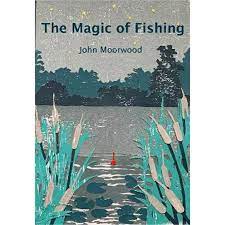
The Magic of Fishing
By John Moorwood
Great Northern Books
238 pages
As a newspaperman for four decades, I shared many a pint with colleagues who waxed poetic about writing books—you know, something they would toss off during idle hours in the unspecified future. Seems copious libation makes writers of us all. While most never got around to it, a few did, with mixed results. Many anglers cast comparable dreams of turning memorable fish into memorable words.
In the preface of The Magic of Fishing, English writer John Moorwood confides that he had always wanted to write a book to ‘celebrate my lifelong passion for fishing.’ He didn’t get around to it for many years because of ‘other priorities, like sleeping.’ We’ve all been there. However, count me as one of many readers delighted that he finally put pen to paper (or sat down at the keyboard).
The Magic of Fishing is aptly titled, for as Moorwood explains: ‘Magic is one of the few words that does justice to the sheer joy of one of the Earth’s most popular and ancient pastimes.’ Few anglers determined ‘to lose oneself in the landscape’ and ‘connect with something hidden and unpredictable’ would disagree.
The memoir echoes with the cadences of William Blake’s Songs of Innocence and Experience. The first part is a portrait of the angler as a young man, equal parts coming-of-age story and angling apprenticeship chronicle.
Fishing stories are often built on a foundation of nostalgia. Moorwood is no exception. As a young lad he was fortunate to have a mentor to serve as guide, instructor, confidante and companion. He acknowledges his good fortune in the person of his kind, patient, loving grandfather who was wise enough to extend his teachings beyond the how, when and where to include the more elusive whys and wherefores. A reader can feel the deep affection shared between the generations in the following passage: ‘Everything was glowing with an early evening radiance, including Granddad’s face as he handed me a packet of hooks before returning to his basket to light his pipe.’
Moorwood also understands that sympathy is the line that binds angling friendships. While fishing is by nature a solitary, private activity, it’s enriched through fellowship with other like-minded people. He invites readers to join in the camaraderie and congeniality offered by a couple of fishing organizations: first, the Dronfield Woodhouse Sports and Social Club in his birthplace of Sheffield; later, the Woking and District Angling Association after he moved south to work in Surrey.

The second part of this charming ‘ode to angling’ follows the author as he negotiates the vicissitudes of carving out a career (with its inevitable ups and downs, successes and setbacks) while becoming a husband (twice over) and a father. Fate arrives as an unexpected guest to many anglers. It so happens a couple of periods of unplanned unemployment not only rekindled Moorwood’s love of fishing, they gave him time to reflect upon and to record his experiences on the water, spanning nearly half a century.
Readers accompany Moorwood as he fishes numerous rivers, lakes and reservoirs including the River Trent as a youth and the River Wey as an adult. Although I’m not keen on fishing competitions of any kind, my bias didn’t prevent me from pulling for him as he competes in ‘match fishing’ and develops a taste for ’specimen hunting.’
I remained at his side with every cast as he observes: ‘Fishing always inspires hope — a lovely, uncertain yet wishful belief that today might just be the day. And while I have no doubt that golfers, rugby fans and keen flower arrangers can wake up and pray for a perfect sequence of events, I’m less sure they can touch the all-consuming anticipation of a young angler.’ The only thing I might add is that any angler devoted to the recreation is forever young.
The Magic of Fishing should appeal to anyone bitten by the piscatorial bug, irrespective of age, background or experience. Moorwood reminds me of the sleepless nights I suffered as a child as I eagerly anticipated a morning on the water (or, being Canadian, on the ice with a hockey stick instead of a rod). Although I’ve never visited England, I identify with his experience because the emotions and feelings he evokes transcend time and place, geography and landscape.
Similarly it didn’t matter that I’m a committed fly angler who fishes primarily for trout, steelhead and bass, while Moorwood is a bait fisherman who fishes primarily for ‘course fish.’ Although I’m an uncompromising purist when it comes to single malt whisky—neat or, when necessary to enhance its essentials, a drop of spring water—when it comes to fishing I believe purity is not only overrated but a divisive encumbrance. For example, while I was thrilled when my eldest son, Dylan, retired his spinning rod for a fly rod, I urged him to fish whenever and wherever he could, with many different anglers regardless of gear or tackle, as a means of learning as much about the ways of water, fish and angling as possible. So it didn’t surprise me that I would connect sympathetically with Moorwood because he was able to articulate the essentials that define the practice of fishing with such clarity, lucidity and precision.
A Sheffield-born communications director who lives in Surrey, Moorwood is not a prose stylist in the narrative current of fellow Brits Chris Yates (a writer he admires), Luke Jennings or Charles Rangeley-Wilson. His approach is more prosaic than literary, in keeping with his professional background. This isn’t a value judgment, just an observation.
Fishing in all its myriad forms and methods is not an escape, as many non-anglers mistakenly assume. Rather it offers a means of engaging with life. The mystery of water, fish and angling provide a pathway to the more inscrutable mysteries of life. Moorwood writes affectionately of extended family, encompassing grandparents, parents, siblings, spouses and children, as he does about friends, colleagues and angling companions, both peers and elders. He celebrates the joy and happiness that blossom from the seedbed of love.
Ernest Hemingway once wrote, ‘All stories, if continued far enough, end in death.’ This certainly applies to stories about fishing. This truth is based on the fact that sooner or later all anglers, even those who pledge allegiance to catch-and-release, confront death through the very act of fishing. Accordingly Moorwood mourns the loss that accompanies separation and death with deep feeling and eloquence.
What I appreciate most about The Magic of Fishing is its implicit understanding that fishing provides the solace and the space (emotional, mental, spiritual) necessary to coming to terms with grief, one life’s great challenges. Like the finest angling literature, the memoir is rubbed with a soft elegiac gloss that persists without overwhelming. At one point he confides ‘fishing saved me.’ I know from personal experience that this gift can be true.
I’m reluctant to end on a sour note. Still, while I was pleased Moorwood visited Ontario, my home for most of my seventy-plus years, I can assure readers there are no ‘snow-capped mountains’ in the province, as he attests. I suspect he observed the Niagara Escarpment when he fished the Beaver River. Also, while steelhead are indeed ‘a hard-fighting cousin of the brown trout,’ it might have been more helpful for British readers to know they are migratory rainbow trout.
This book review was written originally for Classic Angling, Great Britain’s premium fishing journal.